Emily C.A. Snyder's Blog, page 3
December 22, 2017
Let There Be Light: Performing Beauty When the World Seems Worst
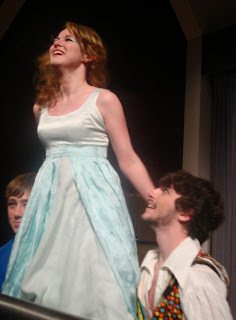 "Excuse me?"
"Excuse me?"The young girl, a high school student from a well-known drama program in direct competition with our own came up to our stage manager, tugging on her arm.
The stage manager, a high school student herself, turned around. "Yes?"
"I just wanted to tell you, to tell someone from your show, that your play changed my life. I just wanted to tell you that."
The young woman went on to explain that she was best friends with the lead actress in her own school's play, which was a dark, semi-classical piece about violence and rape. Apparently, this girl had been helping her best friend out with the psychological repercussions of embodying that role night after night, week after week, month after month. This was an award-winning school after all and, true to form, their dark play continued on for several months after this encounter, trudging its bleak and psychologically challenging way through to the state finals.
Our show didn't get anywhere near that far.
We were touring The Light Princess, my stage adaptation of George MacDonald's fairy tale novella (now available from YouthPLAYS). Already we had performed at our home base, and now our scrappy troupe was taking engagements at the local elementary and middle schools, and bringing it to the local drama festivals. Armed with very few props and costumes, pulling off flying and swimming and magic with low-tech practical effects, all underscored by the brilliant composer and pianist, Taylor Benson - himself only a sophomore at the time!
We knew that our show wouldn't win. We didn't build an entire set in three minutes, and there wasn't a single rape or "edgy" piece of material to be found. We had puppets and bubbles and ran through the audience with dragon heads on...
But we made women fly.
And, it turned out, that's exactly what the audience needed.
That high school student wasn't the only one who approached our troupe during our tour. Perhaps my favorite response was from a five year old girl who watched one of our performances, sitting on the edge of her seat and gripping her mother's hand while the Light Princess did aerial acrobatics, aided by the other actors, laughing all the while. The little girl - and I know her, I was her - gripped her mother's hand and loudly whispered:
"Look, Mommy. The princess is flying!"
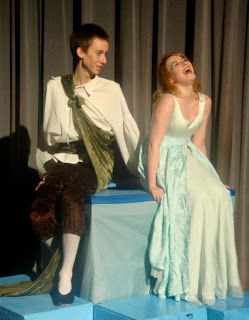 We didn't move on from that competition either. But we didn't need to. If we had only ever performed for that one little girl, I would have been happy.
We didn't move on from that competition either. But we didn't need to. If we had only ever performed for that one little girl, I would have been happy.Writing, directing, producing and touring The Light Princess was one of those wonderful experiences, when you know that what you're doing may not be technically impressive...but it's deeper, it's richer than that.
It's about learning to empathize. It's about learning to sacrifice. It's about learning to cry. And knowing that true happiness always has an element of sorrow. Because if something mattered, it hurts when it's gone.
But ultimately, as it says at the end of the play:
PRINCESS. (Falling down. She has never used her feet before.) Ugh, and I suppose this is your wretched gravity?
PRINCE. (Catching her.) No. No, Princess. This is light.
~*~

Want to support this blog?
Become my patron on Patreon!
Published on December 22, 2017 03:35
December 19, 2017
Defining "Toxic Masculinity," or, Terms of Enragement
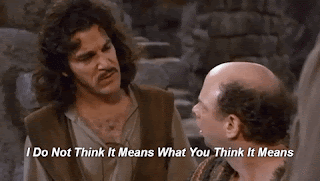 An interesting thing happened on the way to blogging today.
An interesting thing happened on the way to blogging today.Yesterday, I began a series of posts which will attempt to deconstruct the complicated knots around toxic masculinity: particularly in light of the recent power abuse scandals, resulting in sexual and physical aggression, primarily although not exclusively against women.
I began the series, perhaps surprisingly, with a history of my own experiences of positive masculinity among my male mentors. Men who raised me up, rather than kept me down. Men who shaped how I view masculinity: which is noble, kind, protective, encouraging, challenging, and virtuous.
I expected to be lambasted for daring to say that there were good men in the world. Instead, I was lambasted by men for saying anything about men at all.Defining Terms
So, let's start by defining terms. Just what is "toxic masculinity?" Is it a helpful phrase? What exactly are we deconstructing here?
The term "toxic masculinity" appears to have been initially coined by the Mythopoetic Men's Movement (MMM) of the 1980's-90's, which sought to restore the "deep masculine" to modern man. Inspired by the works of Joseph Campbell and Carl Jung, and not to be confused with Tolkein's mythopoeia, the MMM led by Shepherd Bliss used the term "toxic masculinity" to disassociate negative traits among men from the good of masculinity itself.
Things which were deemed toxic to masculinity include:
Shame, disassociation, and avoidance of emotional expression;Extreme self-reliance;The over-aspiration for physical, sexual and intellectual dominance;The systematic devaluation of women's opinions, body and sense of self; and by extensionA condemnation of anything "feminine" within another man.Lingual Appropriation and Retaliation
Since then, the term has been picked up by feminists and has had a recent resurgence in the light of egregious actions done by men, from the sexual misconduct of Louis CK to the apologetics for the same from Matt Damon.
Due to this, there's been a pushback to the term "toxic masculinity" from the modern descendants of the MMM, such as the Menenist movement, #YesAllMen, #NotAllMen, The Red Pill, and others. The pushback has continued through the male apologetics in the conservative right, largely disapproving of the term because of its association to the perceived liberal agenda of the feminist movement.
The usual objection to "toxic masculinity" is that the term may be construed to mean that all men are by nature toxic. Or that masculinity is, at its essence, evil. Of course, for those laboring under this misunderstanding, it's natural that some might object to the term or even deny that toxic masculinity exists. After all, at least in Christian doctrine, all things were created good - including men.
But also in Christian doctrine, all things fell. Including men.
What's Your Poison?
So, by this definition, what does toxic masculinity look like? In my own experience, I've been on the receiving end of overt sexual harassment, as well as systematic sexism in the workplace, too.
Overt sexual harassment - the boy who looked up my skirt, the jock who made unwanted advances for half a year, the Nigerian man in Paris who nearly abducted me, the man on the subway masturbating on the seat across from me - is easy to condemn. It's easy to identify as assault, and therefore easier to press criminal charges. I say "easier," because as we know, it only took several decades before Weinstein's victims were finally believed.
Which brings me to the considerably more insidious toxicity that allowed Weinstein and others to prey on those in their power:
When women's voices are disregarded because they were caught having an opinion while being female.Take the case of Israel Horovitz, a prominent playwright who sexually abused the young women he was mentoring. Although his misdeeds had already been published in a series of articles in 1993 in The Boston Phoenix, the allegations were dismissed. The playwright claimed "character assassination," while the theatre board's then-president called Horovitz' victims, "tightly wound, if you know what I mean." In short, the predator and his accomplice called the women crazy, and everyone believed the predator and his accomplice.
A similar thing happened to me just today. In posting yesterday's article on a few groups on Facebook, I was told by one man that: "Toxic masculinity is a myth... Knock off the divisive BS." While another man (not an author) went to great length to give me advice about how to make my blog more appealing to men, while also calling me "brazen" and saying that it was:
"...preachy for a woman to tell a man how to be a man, especially without conceding that she isn't a man and couldn't possibly know what that's like. It is additionally awkward when the woman spends a particularly large amount of space talking about how she engages in these authentically masculine activities. It comes across as telling us that you both understand masculinity better than men and actually engage in masculine activities more than men."
When asked for further clarification about what emotional wound I was striking in my article complimenting masculinity, or what "authentically masculine activity" I had usurped, I was told that he couldn't be bothered - at which time, his wife swooped in to scold me for hurting his feelings.
This may not be an example of sexual predation, but it is textbook toxicity. Go back to a few of the symptoms of this particular poison:
Shame, disassociation, and avoidance of emotional expression; The over-aspiration for physical, sexual and intellectual dominance;The systematic devaluation of women's opinions, body and sense of self Curiously, towards the end of the exchange with the second man, I found myself feeling more and more toxic myself. Wanting to hurl such unhelpful invective as: "What? Did I make you cry, girly man? Gotta have your wife come out and tell me to shut up?" You know. Fun internalized misogyny that I carry around, too. Toxicity hurts everyone.
A Few Good Men
But perhaps, O my apparent male readership, you cannot hear what I am saying Because Female. In that case, let me introduce you to Harris O'Malley, aka Dr. Nerdlove, who has this to say about what it's like for a man to carry around internalized misandry. (Section quoted nearly in full with picture, because it's worth reading.) In regards to why "good men" don't believe women when they report being victimized:
"One of the issues with being a 'good' man is that it’s definitional. Because we see ourselves as good, we assume that, by default, what we do is good. One of the reasons why sexism and harassment goes unchecked in geek spaces is because geeks often define themselves in contrast to jocks and bullies. Jocks are rape-y, bullying assholes and the opposite of nerds, so clearly nerds can’t be bullying, rape-y assholes. Nice Guys are the opposite of those manipulative assholes so clearly they can’t possibly be manipulating women to get what they want.
"Once you’ve defined yourself as being 'one of the good ones,' it’s very hard to want to look around and admit that maybe you aren’t as good as you could be. Very, very few people like to believe that they might not be the good guy, and so they’re invested in not asking too many questions.
"This is why so many men get their backs up when someone points out that they could be doing better. Criticism, even mild criticism, gets taken as a deeply personal attack because hey: you’re one of the good ones.
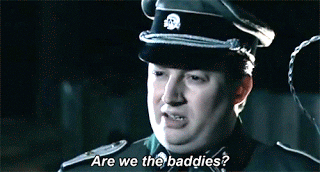 "And that desire to believe in your goodness reflects not just on you but the people you associate with. After all, if you find out that someone in your social circle has been harassing women… well, what does that say about you? You’re a good man. You’d never put up with this. But you did. So what does that say about you?
"And that desire to believe in your goodness reflects not just on you but the people you associate with. After all, if you find out that someone in your social circle has been harassing women… well, what does that say about you? You’re a good man. You’d never put up with this. But you did. So what does that say about you? "This doesn’t happen at the conscious level. Nobody thinks to themselves 'I’d rather keep my friend who gets drunk and tries to corner women in the bathroom because admitting he’s rape-y reflects badly on my choices.' What they do think is that this is their friend. He’s shared their secrets. He’s invited them to his parties, made them laugh. They’ve broken bread together and drank beers together. Surely he can’t be that bad, right? There has to be a reason that this isn’t as bad as it seems.
"And so the rationalization begins. Maybe she was mistaken. She must be exaggerating. He didn’t mean it. He’s not that bad. It’s not him, it’s the drinking. It’s the drugs. He’s going through a bad time.
"It’s easier to explain why your problematic friend isn’t bad than it is to look around and realize that you need to improve.
"The other, related reason however is that same system that empowers men. Men tend to believe other men above women. Many of these scandals only 'broke' because a man reported on them – despite women shouting about it to the skies. The fact that Bill Cosby was drugging and raping women was an open secret in Hollywood. Multiple women came forward to accuse Cosby and nobody listened or cared. But once Hannibal Buress called him out publicly, the story began to get traction. Many, many women – especially trans women – were shouting about Milo [Yiannopoulos], but again, it took a Buzzfeed article written by a man to finally make everyone sit up and listen.
"This isn’t to say that they shouldn’t have spoken up. But it’s important to acknowledge system [sic] that privileges their voices above the voices (and lived experiences) of their victims."
I recommending reading his blog, although be warned that he doesn't shy away from language. But for those of you struggling with some wound regarding your masculinity, and seething that I might have something to say about it, may I suggest you go see the doctor?
Now to those still remaining...!
A Voice to be Reckoned With
So, let's engage from afar with man number two. Upon what authority do I speak about the poisons plaguing too many modern men? Well, I speak with the same authority as a mother does to her son, or a sister to her brothers, a teacher to her students, a doctor to her patient. A lover to her beloved.
Because at the end of the day, nothing gets changed without love. Nor do you have any reason to listen to me if you presume I am the enemy, or if I come at you with hatred and a desire for your destruction. No. I desire the restitution - as far as that is possible in this corrupted world - of positive masculinity within men. Just as I desire the restitution of positive femininity within women. (Something that I'm sure I'll be writing about more, soon.)
Nor do I entirely blame those men who see the term "toxic masculinity" and immediately presume they are being personally singled out to be shamed. The very term they dislike is the very thing that haunts them. The shame, and inability to name that shame, is the very poisonous thing being suffered. The need to keep a certain "pride" by silencing the women - especially the women - who would dare to name the disease is the very thing killing their souls. But it can be overcome.
And, like Wormtongue's hold on Theoden, to return to Tolkein's mythopoeia, it's this very homebody toxicity which must be excised in order to let positive masculinity flourish. Take it away, Gandalf:
~*~

Want to support this blog?
Become my patron on Patreon!
Published on December 19, 2017 02:09
December 16, 2017
You Have to be Carefully Taught: On Beautiful Masculinity
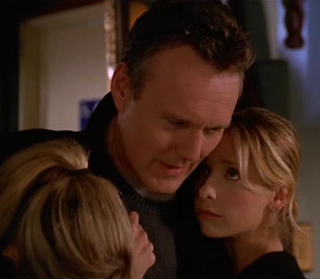 Rupert Giles from Buffy the Vampire Slayer:
Rupert Giles from Buffy the Vampire Slayer: a beautiful model of male mentorshipThe other day, while shooting the breeze with a friend, she mentioned:
"There's a correlation, you know, between these frequent mass murder shootings and the recent sex scandals."
"What's that?" I asked.
"Well, think about it: from my research, the shootings and even these sex scandals revolve around men. Men who are trained in toxic masculinity. Who are told that to be a true man, you can't feel, can't emote, can't want, can't cry. Yet, they still have those needs. So what do they do? They explode: either with physical or sexual violence. They're trying to connect, and if they can't, they destroy. They're trying to communicate, but they haven't been taught how.
"The question I have," she continued, "is what do we do about that? How do we counteract toxic masculinity in our culture?"
"Well," I replied, thinking of my own theatrical sons, as well as my educational fathers, "it's really a matter of 'you have to be carefully taught.'"
From Generation to Generation
From high school through grad school, I had a number of wonderful male mentors. Male mentors who took me seriously, who challenged me intellectually, who went the extra mile and pushed me to go the extra mile, too.
In high school, my best friend and I were the editors-in-chief of everything (quelle surprise!), which meant long Saturday afternoons at one of our teacher's houses, going through all the poetry submissions, or early Saturday mornings going over yearbook layouts with another teacher who brought donuts. In college, my theatre professor would open the doors of his home to some of the upper classmen, where he and his wife and his growing number of children would chat with us about theatre and life over some of the heartiest farm bacon I've ever had. In grad school, my professor was kind enough to set aside whole hours not only to talk about verse drama, and the future of my career, but also to listen to my life woes and offer sage advice.
I value these men who gave so much time and encouragement to me, and who certainly shaped my own life and outlook on teaching, mentoring, and basic human kindness. And, in retrospect, it was important to me as a young woman to have these prevalent examples of kindly, wise, strong, and yet never domineering men in my life. Without knowing what I was doing, I was seeking out foster fathers: stepping stones between my own father and someone who might father my children.
A Whole New World
Something else I also learned from my family and from these men was the beauty and innocence of touch.
Most of you shuddered at that word, didn't you? Thinking that right now this story would go off into a really dark place. Thinking that I've got something suppressed. But that's not the case. My theatrical mentors rarely touched me, to be honest, but they also weren't afraid to pat me on the back, or to give me a hug at graduation. Since they were largely theatrical mentors, they also facilitated safe spaces to touch others on the stage, to make bold yet respectful choices regarding my own body and my fellow actors'. To ask for permissions as necessary. And then they pushed me to create that same safe space as a director for my actors, even when we were doing challenging and potentially scary plays.
They taught me by example that touch is just touch. That it is not automatically sexual. That it is a way we communicate. That it is vital. That it is comfort. That it can be safe. They taught me that opening up a home is a beautiful thing, and not an automatic invitation to predatory behavior. The amount of adult I felt when one of my high school mentors invited us into his well-appointed home, his wife out gardening in the back: the opportunity to see another way to live, another way to run a home was remarkable. I remember thinking clearly, one night as an English professor and his wife showed me around their home stuffed full of shelves, before I babysat their kids, "I could live like this. I could live happily in academia forever." (And in fact, for ten years after college, I did.)
Paying It Forward
I fell into teaching, and therefore into mentoring, by accident. After college, I was fairly lost until a teaching position opened up for K-8 at a local Catholic school. Against all reason, they hired me to teach music and art, and at the end of the year we parted ways. I spent the following year substitute teaching, and quickly learned that I preferred teaching high school over middle school students. So when a position to teach theology at a local Catholic high school opened up (on the proviso that I also run the drama program), I took it.
I must have only been 25 when, in my fourth year of teaching, one of my male students started hanging out in my classroom after school. The priest scandal had just broken in Boston, and I was teaching theology. We were all on high alert regarding proper relationships. Fortunately, my classroom happened to be in a large trailer that had a wall of windows overlooking the parking lot, which helped a lot when I was the only adult in the room rehearsing a passel of kids.
As it was still autumn, our school plays hadn't yet begun. So, this student - my first "theatrical son" whom we'll call Robin - began hanging out in my room while I ostensibly attempted to grade papers. At first he asked whether he could wait there to watch for his Mom's car to pick him up. I agreed, since it is truly depressing to wait in the gym for the same purpose, and since he was a fairly quiet student who'd been good enough to tech Brigadoon the previous year.
One afternoon waiting in my room turned into two, and then several times a week thereafter. So I put him to work cleaning my boards, since this appeared to be a regular thing. After a little bit of time, Robin started to ask me questions about what I thought about this or that life question, and since I hate grading with a passion, I'd answer him. Within a month, he stopped doing chores around my classroom, and just came in to talk about life without apology.
Eventually, I realized Robin was adopting me. That he was a Lost Boy, looking for a Mother. That I was to him what my professors were to me. And I'm thrilled and teary to say that he's since grown into a fine young man, who's teaching and mentoring theatrical children of his own.
Opening Houses, Opening Hearts
Did I touch my students? Yes, I did. Hugs at their successes. Teaching young men and women how to hold a frame in a waltz. Smacking Robin upside the head when after a bitter break-up, he started verbally objectifying the girls in the class. My family's house hosted cast parties, and we all went over to have cast parties at students' house, too. Because one of the things I found important as a theatre teacher was to try to mend relationships between the students adopting me and their real parents. Mary Poppins, if you will. A lot of Mary Poppins.
Like my own professors, as the adult I was hyperaware of having multiple students around if I was stuck being the only adult at rehearsal. I valued those huge windows that anyone could see in when there were one-on-one sessions with students who needed to run their latest life crisis past me. When I was moved to another classroom without those windows, a teacher buddy and I always let each other know if a student needed a one-on-one, and we'd leave the door slightly ajar and keep an ear out for each other.
As students grew into young adults in college, and still communicating with their parents in the days before cell phones, I did give the occasional ride in my car to get a student to rehearsal. And once, as I was out for a late-night drive to clear my head, I stopped and made a female theatre student of mine who was wandering around in the freezing cold at 11 PM get into my car so I could drive her the two miles home, rules be damned, because I wasn't leaving my student out in the cold. And besides, I told her mom.
Childproofing for Teenagers
It's interesting: as the teenager and young woman, all I knew from my male mentors was that I was safe. I didn't give much thought to this teacher's wife gardening in the back yard while my best friend, our teacher and myself sat around his dining table and discussed poetry. I didn't give much thought to the fact that there were three of us at yearbook camp with our male teacher, or that we all had separate places to sleep. Things were set up in a safe way, and these were safe men.
As the mentor, though, I was constantly aware of childproofing the relationship. When we decided to give upper body "tattoos" to the fairies for A Midsummer Night's Dream, I handed off the job to my sister who's an artist. However, when several male actors needed to have special make-up - including malaria - for South Pacific, it actually was safer to have me help them out in the crowded dressing room than hand it off to the randy, giggling, star-struck tween girls. There was a lot of communication with parents: bringing them backstage, bringing them into the process. Transparency was key. Being an example was key. As was one more element, because as the saying goes...
It Takes a Village
Ultimately, if you want to change the culture, you need to be the example you want to see in the culture. Without saying a word, or shaming me, or making me feel like a legal threat to them, my male mentors invited me not into their private dressing rooms, or offices, or what not...instead, they truly invited me into their lives. They invited me into their society, and let me have a place at the table. There was safety, because their own lives were full of family, colleagues, and interesting people full of interesting ideas.
This wasn't Mike Pence's pejorative rule that promotes an "old boy's network," but instead these good men exampled right relation and community. They expected me to be able to hold my own as a student among adults. They lived lives that had nothing to hide and could be examined. They may not have asked a village to raise me but instead they gave me a world. All without saying a word. No mansplaining to be found. (Although a lot of Socratic questioning!)
As news keeps pouring out, as it did during the priest scandals, of men abusing their positions of power, of pedophilia and assault, of mentors like Israel Horovitz,
Therefore, I write this all to remind me, to paraphrase Samwise Gamgee, that there are good men in this world, and they're worth fighting for. But even more, I think they're worth raising: in spirits, in expectation, in accountability, in kindness.
And Blogs To Go Before I Sleep
I have considerably more to write about this topic of toxic masculinity. And I will be writing it in the days to come. But I wanted to begin with what we're aiming for, rather than what we're destroying. Because any revolution - be it sexual or civil - is no good, since it must inevitable revolve to where the mess began. But to work towards something, to know what you're fighting for: that is the way to do some good in this world. And by God, I think it's worth doing.
~*~

Want to support this blog?
Become my patron on Patreon!
Published on December 16, 2017 23:19
December 14, 2017
It Ain't Over 'Til the Thin Lady Sings
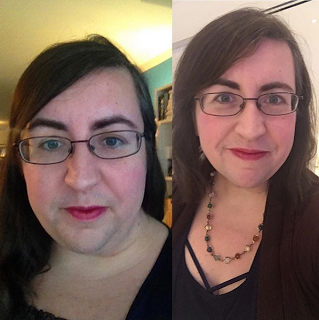 All my life, I've wanted to be thin.
All my life, I've wanted to be thin.There, I've said it.
I've hated my love handles, my double chin, my stomach.
No matter if anyone told me I was pretty (which, by the way, wasn't often - or if it was often, I couldn't hear it), I had difficulty believing that I was allowed to be visible. I've blogged about this before, and I'm sure I'll blog about it again, but it was "safer" for me to be fat. Not just from the vagaries of the world, but also from myself.
There's a wonderful line from Jane Austen's Mansfield Park: “You must really begin to harden yourself to the idea of being worth looking at.” (Chapter XXI)
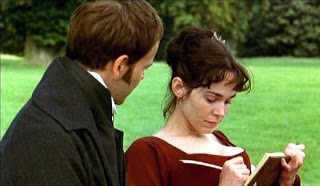 One of the things that I've been working through in this year of thinning down is how I've pursued socially acceptable ways of being invisible - of teaching, writing, directing - all good, even great things.
One of the things that I've been working through in this year of thinning down is how I've pursued socially acceptable ways of being invisible - of teaching, writing, directing - all good, even great things.But all "unhardened" to the idea of worth being looked at.
So as I was clearing out my iPhone, I was interested to run across a video from October 2016, which you can see interspersed with Emily December 2017 below. For context, at that time I was at my peak of weight gain, being some two years out from the break up and in the middle of a disastrous run of a show which still involved the ex. (Never let it be said that I passed up an opportunity to make a poor decision!)
Having been systematically beaten down and made little through a few outside influences, including that mentioned above, while also being emotionally manipulated by a business partner, and just New York City being...well, New York City, I wasn't in the most awesome of places. As you can see in the video, I'm flitting around quickly as though "if I go fast enough, you won't have time to criticize me." You can hear it in the greater fluttering of my singing voice, let alone how high and nervous my speaking voice is.
In fact, about the only thing I miss about Emily of October 2016 is my hair. (Your hair thins out along with your body for a time after surgery. Please God, the former's coming back.)
Yet this video is important, because it was also just a week or two before I made the decision to alter my life forever. It was a week or two before the play with the ex stopped, and I was finally able to excise him from my life. It was maybe a month or two before I removed the unhelpful professional influence. And it was just four weeks before I decided to bite the bullet, jump through every hoop, cross every T and dot every I, get all the blood drawn from my body, visit every doctor, submit to every test, change my eating habits and get my damn life under control, dear God help me, AMEN!
Among the other changes, in January 2017, after receiving The Art of Asking by Amanda Palmer from my dear friend (who's mentioned in the footage above, and who used to accompany my operatic singing in high school...so long as she could rename all the French music with silly titles), I began a Patreon page. Another dear friend immediately signed up for Monthly Music, which was more than a little terrifying since it meant that I must, at least periodically, be seen. (You can check out the playlist of me singing on YouTube, and then access considerably more secret videos over on Patreon.)
I never released the above video from October 2016. And to my chagrin, I've destroyed a few of older videos since. But there's something about literally facing yourself, and so I've recorded Emily of December 2017 singing the same song to see not only how my body but how my soul is a year later.
What I see, at least as far as one can see anything, is that I'm certainly more at peace. More calm, more collected, more willing to make a mistake and roll with it. My voice has a straighter and less quavery tone. I'm not rushing. I'm better at being seen. I'm not constantly running away, at least as much, anymore. It's still nice to see my face, my clavicles, myself emerge. I feel like I'm looking, and being, more like myself.
 Which is the whole purpose to life, isn't it?
Which is the whole purpose to life, isn't it?That's what vocation is: called to be the fullness of yourself. Not just who you should marry, or what lucrative job you should pursue, which all may factor into the theodrama, but which are only tools towards vocation, not vocation itself. Rather, we are each called to true humility: which is to see yourself, and to let yourself be seen. Both those parts of you that still need work, and those parts of you that shine. To be without apology for either. As a certain skull carrying Dane might say: "To be."
I am still learning this. I suspect I shall be learning this my whole life, if the saints are any guide. But considering that I've plateaued at present with my weight loss, considering that it can be easy to forget who you were or where you've come from in the desire to leave past trauma behind, I thought it might be worth not only to stop running, but to stop running from myself.
~*~

Want to support this blog?
Become my patron on Patreon!
Published on December 14, 2017 23:38
December 11, 2017
The Merry WIDOWS of Windsor: Rewriting Shakespeare in the Light of #MeToo
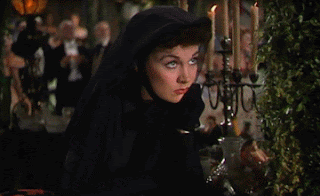 This weekend, I had the pleasure of seeing Hamlet Isn't Dead's production of
The Merry Wives of Windsor
.
This weekend, I had the pleasure of seeing Hamlet Isn't Dead's production of
The Merry Wives of Windsor
.(You can read the full review on my Classical NYC blog here.)
I was looking forward to the production for several reasons:
Merry Wives is a terrible play. But the HIDiots put on lively, comical takes of Shakespeare's plays. Add in an ugly sweater competition to the final scene, and you've got a hit.
Because the play isn't very good, it's rarely performed. In fact, the last production I saw, featuring an ex in a minor role, was...pretty awful. (He was ok. But, like, still...) Therefore:
I was primarily excited to see a new take on Merry Wives, because I'm in the middle of writing the sequel, The Merry Widows of Windsor. A Call for FanFiction...er...Shakespeare's New Contemporaries
Why am I writing a sequel to Merry Wives? Well, if you haven't heard yet, the American Shakespeare Center is funding a new play development program called Shakespeare's New Contemporaries.
The project aims to develop and produce the world premieres of 38 new plays which would be in conversation with Shakespeare's canon. Ideally, I would imagine, the plays would be more overtly connected, like Rosencrantz and Guildenstern are Dead, than loosely or thematically connected, such as one might argue that Caspar the Friendly Ghost is in conversation with Hamlet because...um...ghosts.
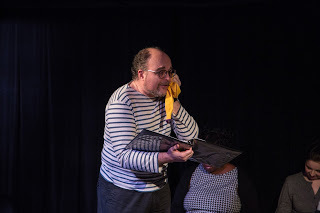 Malvolio (Elliot Nesterman) comforts himself
Malvolio (Elliot Nesterman) comforts himself with a certain yellow stocking!
With this in mind, I've already taken the opportunity to write and have a staged reading of my Comedy of Heirors, which has twice the twins, twice the women, and Malvolio running after everyone. It went over very well with a wonderful cast, willing to tackle the complicated plot, Shakespearean Easter eggs, and even adding in things like a yellow stocking as a security blanket.
While writing the piece, I was highly aware that in the original Comedy of Errors, even the "good" Antipholus twin treats his servant despicably. And that we're asked to laugh at this behavior. In writing the female version of that, I was more interested in the friendships that can exist between women, even of different classes. Thus, much of the conflict between the Glorielles and the Dromias doesn't arise from their cruelty, but from their desire to do good for the other...whether they like it or not.
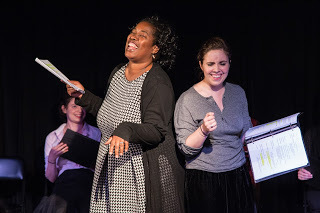 Lady Dromia of Syracuse (Cecily Benjamin Hughes)
Lady Dromia of Syracuse (Cecily Benjamin Hughes) mistakes Glorielle of Ephesus (Erin Keskeny) for her servant
The Comedy of Heirors, staged reading
produced by TURN TO FLESH PRODUCTIONS.I was also interested in giving the straying Antipholus of Ephesus his actual comeuppance. The women in A Comedy of Errors are problematic to say the least. In fact, most roles written for women depend utterly upon their relation to men. So it was lovely to write a multitude of female starring roles: the ninja-fighting nun, the ambitious servant, the swashbuckling romantic, and the melodramatic "other woman" who needs to be rescued from herself among others.
So now, I'm turning my attentions to rectifying the women of Merry Wives.
Comedy is Merely Tragedy Happening to Someone Else
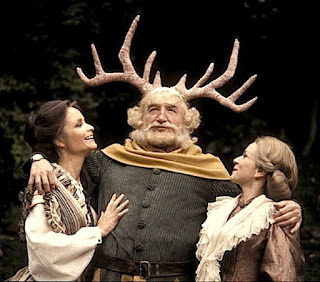 The Fiction:
The Fiction:The male gaze towards sexual misconduct
Merry Wives of Windsor, New Shakespeare Company, 1984One of my major issues with Merry Wives are the wives themselves. I have now seen the show a handful of times and, except that I'm writing the characters now, I can never ever ever tell Mistress Ford and Mistress Page apart. They have first names, but no one ever uses them. And their last names are almost interchangeable. About the only difference is who's attached to them: one has a jealous husband, one has a few children. In personality, on the page at any rate, either woman could say either of their lines and there would be no difference in rhythm or "voice" between them.
What's more, let's look at the plot of the play. Especially in light of the #metoo movement. Fat, old, disgusting, lecherous Falstaff comes to town and immediately starts hitting on two married women. They laugh it off, especially once they realize he's essentially sent them the same "U up?" text message. Together, they devise a way to humiliate him. Except that Mistress Ford's husband decides to believe that his wife is cuckolding him and goes to great lengths to trip up his wife and catch her cheating on him. In the end, Falstaff is humiliated, ends with a poor rhyme about the Fords having sex, and all is...forgiven?
No. No, not really. No.
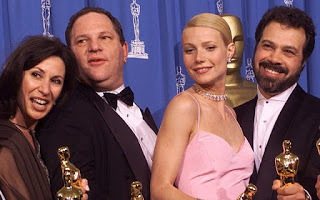 The Reality:Weinstein winning an Oscar for Shakespeare in Love.
The Reality:Weinstein winning an Oscar for Shakespeare in Love.Gwyneth Paltrow has since come forward
to accuse Weinstein of grave sexual misconduct
A lech comes to town and harasses two married women. We're supposed to laugh. A husband goes bananas certain that his wife is cheating on him, and sets up means to humiliate her. We're not supposed to worry about what their marriage is like behind closed doors? It might be funny, if sexual harassment were funny. It might be funny, if marital misogyny were funny.
And to be fair, in production the play is mostly funny. The characters are ridiculous. There's a relief that Falstaff fails in his attempts to woo. The Merry Wives generally play everything as one big game and who cares who behaved like an idiot? It's all fun and games and freeze framing for the end of the sitcom.
But that's the male gaze of the situation. Everything's all right because Falstaff didn't sleep with Mistress Ford. But everything's not all right, because Falstaff tried that to begin with, and far from protecting his wife, Francis Ford blames his wife immediately. Tale as old as time...
But that's why we have modern playwrights, right?
Smile, Though Your Heart is Breaking
In considering writing a companion piece for Merry Wives, the most obvious title of Merry Widows sprang to mind. At first, I wondered if it ought to be Arsenic and Old Lace-like. And then poked about Lehár's Merry Widow operetta for inspiration. But eventually, I decided to just see what would happen if I killed off everybody's husband. Where does that leave Mistress Ford and Mistress Page? Sitcom logic tells us that both women will just be ready to go for the next handsome man who crosses their paths. But grieving doesn't work like that. And for that matter: would the women grieve in the same way? Mistress Ford with her maniacally jealous husband is likely thrilled to be free at last, while the family-oriented Mistress Page may be truly lost without her spouse.
 And what does it mean to grieve? A few years ago, I went through a rather traumatic and sudden break-up which, while a far cry from a death, nevertheless left me with several years of an ache for one specific person. As time went by, and the proverbial scales fell from my eyes, I've had to deal with the difference between my memory of the man I loved, and the man he really was. How much do we grieve the person vs. the idea? How much do we love the idea over the person? And what does it mean to suddenly be an "I" after years thinking as "we?" How much does freedom hurt?
And what does it mean to grieve? A few years ago, I went through a rather traumatic and sudden break-up which, while a far cry from a death, nevertheless left me with several years of an ache for one specific person. As time went by, and the proverbial scales fell from my eyes, I've had to deal with the difference between my memory of the man I loved, and the man he really was. How much do we grieve the person vs. the idea? How much do we love the idea over the person? And what does it mean to suddenly be an "I" after years thinking as "we?" How much does freedom hurt?That's not to say that my Merry Widows of Windsor won't still be a comedy. But it will be a comedy in despite of reality. So many of my girlfriends in dealing with various losses - of their spouses, their parents, their children - struggle with "how long" they grieve. There's a general idea, at least among women, that at some point we should simply be in charge of our emotions. There are things to do! There is life to live! We should be fine. Look: we are laughing, we are living, we are fine.
And then grief comes up like an unexpected storm: conjured by standing in the supermarket and buying Grey Poupon. And there are regrets we mourn, too, even as we are glad to be autonomous. There's French farce to be found in the dehaunting of a house.
Looking at the Old Through the Lens of the New
I'm glad to have seen Hamlet Isn't Dead's Merry Wives, all the moreso since I hope that these two plays will work seamlessly together. It was vindicating to see their Mistress Ford slightly hesitant and smiling through her jealous husband's mania. Even vindicating to see the love between Mistress Page and her husband. Helpful to see that my instincts about Fenton, young Anne Page's successful paramour, being something of a rounder are thoroughly backed up by the text. (And after the hilarious turn of the vaaaarhy Franch Dr. Caius, he may make a reappearance in this text. We'll see!)
I don't feel that I have a hold of Quickly, Bardolph, Nym and Pistol yet. That's fine. I'll just have to watch a lot of Shakespeare interpretations to get a better idea of them.
But I can tell you with no hesitation that at least in my Merry Widows...Falstaff is dead.
Why?
'Cuz, ladies, we don't need him.
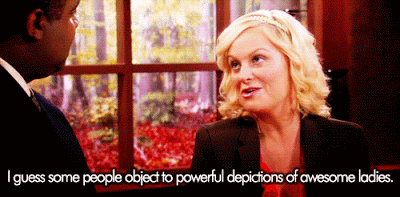
~*~

Want to support this blog?
Become my patron on Patreon!
Published on December 11, 2017 00:57
The Merry WIDOWS of Windsor: Rewriting Shakespeare in the Light of #metoo
 This weekend, I had the pleasure of seeing Hamlet Isn't Dead's production of
The Merry Wives of Windsor
.
This weekend, I had the pleasure of seeing Hamlet Isn't Dead's production of
The Merry Wives of Windsor
.(You can read the full review on my Classical NYC blog here.)
I was looking forward to the production for several reasons:
Merry Wives is a terrible play. But the HIDiots put on lively, comical takes of Shakespeare's plays. Add in an ugly sweater competition to the final scene, and you've got a hit.
Because the play isn't very good, it's rarely performed. In fact, the last production I saw, featuring an ex in a minor role, was...pretty awful. (He was ok. But, like, still...) Therefore:
I was primarily excited to see a new take on Merry Wives, because I'm in the middle of writing the sequel, The Merry Widows of Windsor. A Call for FanFiction...er...Shakespeare's New Contemporaries
Why am I writing a sequel to Merry Wives? Well, if you haven't heard yet, the American Shakespeare Center is funding a new play development program called Shakespeare's New Contemporaries.
The project aims to develop and produce the world premieres of 38 new plays which would be in conversation with Shakespeare's canon. Ideally, I would imagine, the plays would be more overtly connected, like Rosencrantz and Guildenstern are Dead, than loosely or thematically connected, such as one might argue that Caspar the Friendly Ghost is in conversation with Hamlet because...um...ghosts.
 Malvolio (Elliot Nesterman) comforts himself
Malvolio (Elliot Nesterman) comforts himself with a certain yellow stocking!
With this in mind, I've already taken the opportunity to write and have a staged reading of my Comedy of Heirors, which has twice the twins, twice the women, and Malvolio running after everyone. It went over very well with a wonderful cast, willing to tackle the complicated plot, Shakespearean Easter eggs, and even adding in things like a yellow stocking as a security blanket.
While writing the piece, I was highly aware that in the original Comedy of Errors, even the "good" Antipholus twin treats his servant despicably. And that we're asked to laugh at this behavior. In writing the female version of that, I was more interested in the friendships that can exist between women, even of different classes. Thus, much of the conflict between the Glorielles and the Dromias doesn't arise from their cruelty, but from their desire to do good for the other...whether they like it or not.
 Lady Dromia of Syracuse (Cecily Benjamin Hughes)
Lady Dromia of Syracuse (Cecily Benjamin Hughes) mistakes Glorielle of Ephesus (Erin Keskeny) for her servant
The Comedy of Heirors, staged reading
produced by TURN TO FLESH PRODUCTIONS.I was also interested in giving the straying Antipholus of Ephesus his actual comeuppance. The women in A Comedy of Errors are problematic to say the least. In fact, most roles written for women depend utterly upon their relation to men. So it was lovely to write a multitude of female starring roles: the ninja-fighting nun, the ambitious servant, the swashbuckling romantic, and the melodramatic "other woman" who needs to be rescued from herself among others.
So now, I'm turning my attentions to rectifying the women of Merry Wives.
Comedy is Merely Tragedy Happening to Someone Else
 The Fiction:
The Fiction:The male gaze towards sexual misconduct
Merry Wives of Windsor, New Shakespeare Company, 1984One of my major issues with Merry Wives are the wives themselves. I have now seen the show a handful of times and, except that I'm writing the characters now, I can never ever ever tell Mistress Ford and Mistress Page apart. They have first names, but no one ever uses them. And their last names are almost interchangeable. About the only difference is who's attached to them: one has a jealous husband, one has a few children. In personality, on the page at any rate, either woman could say either of their lines and there would be no difference in rhythm or "voice" between them.
What's more, let's look at the plot of the play. Especially in light of the #metoo movement. Fat, old, disgusting, lecherous Falstaff comes to town and immediately starts hitting on two married women. They laugh it off, especially once they realize he's essentially sent them the same "U up?" text message. Together, they devise a way to humiliate him. Except that Mistress Ford's husband decides to believe that his wife is cuckolding him and goes to great lengths to trip up his wife and catch her cheating on him. In the end, Falstaff is humiliated, ends with a poor rhyme about the Fords having sex, and all is...forgiven?
No. No, not really. No.
 The Reality:Weinstein winning an Oscar for Shakespeare in Love.
The Reality:Weinstein winning an Oscar for Shakespeare in Love.Gwyneth Paltrow has since come forward
to accuse Weinstein of grave sexual misconduct
A lech comes to town and harasses two married women. We're supposed to laugh. A husband goes bananas certain that his wife is cheating on him, and sets up means to humiliate her. We're not supposed to worry about what their marriage is like behind closed doors? It might be funny, if sexual harassment were funny. It might be funny, if marital misogyny were funny.
And to be fair, in production the play is mostly funny. The characters are ridiculous. There's a relief that Falstaff fails in his attempts to woo. The Merry Wives generally play everything as one big game and who cares who behaved like an idiot? It's all fun and games and freeze framing for the end of the sitcom.
But that's the male gaze of the situation. Everything's all right because Falstaff didn't sleep with Mistress Ford. But everything's not all right, because Falstaff tried that to begin with, and far from protecting his wife, Francis Ford blames his wife immediately. Tale as old as time...
But that's why we have modern playwrights, right?
Smile, Though Your Heart is Breaking
In considering writing a companion piece for Merry Wives, the most obvious title of Merry Widows sprang to mind. At first, I wondered if it ought to be Arsenic and Old Lace-like. And then poked about Lehár's Merry Widow operetta for inspiration. But eventually, I decided to just see what would happen if I killed off everybody's husband. Where does that leave Mistress Ford and Mistress Page? Sitcom logic tells us that both women will just be ready to go for the next handsome man who crosses their paths. But grieving doesn't work like that. And for that matter: would the women grieve in the same way? Mistress Ford with her maniacally jealous husband is likely thrilled to be free at last, while the family-oriented Mistress Page may be truly lost without her spouse.
 And what does it mean to grieve? A few years ago, I went through a rather traumatic and sudden break-up which, while a far cry from a death, nevertheless left me with several years of an ache for one specific person. As time went by, and the proverbial scales fell from my eyes, I've had to deal with the difference between my memory of the man I loved, and the man he really was. How much do we grieve the person vs. the idea? How much do we love the idea over the person? And what does it mean to suddenly be an "I" after years thinking as "we?" How much does freedom hurt?
And what does it mean to grieve? A few years ago, I went through a rather traumatic and sudden break-up which, while a far cry from a death, nevertheless left me with several years of an ache for one specific person. As time went by, and the proverbial scales fell from my eyes, I've had to deal with the difference between my memory of the man I loved, and the man he really was. How much do we grieve the person vs. the idea? How much do we love the idea over the person? And what does it mean to suddenly be an "I" after years thinking as "we?" How much does freedom hurt?That's not to say that my Merry Widows of Windsor won't still be a comedy. But it will be a comedy in despite of reality. So many of my girlfriends in dealing with various losses - of their spouses, their parents, their children - struggle with "how long" they grieve. There's a general idea, at least among women, that at some point we should simply be in charge of our emotions. There are things to do! There is life to live! We should be fine. Look: we are laughing, we are living, we are fine.
And then grief comes up like an unexpected storm: conjured by standing in the supermarket and buying Grey Poupon. And there are regrets we mourn, too, even as we are glad to be autonomous. There's French farce to be found in the dehaunting of a house.
Looking at the Old Through the Lens of the New
I'm glad to have seen Hamlet Isn't Dead's Merry Wives, all the moreso since I hope that these two plays will work seamlessly together. It was vindicating to see their Mistress Ford slightly hesitant and smiling through her jealous husband's mania. Even vindicating to see the love between Mistress Page and her husband. Helpful to see that my instincts about Fenton, young Anne Page's successful paramour, being something of a rounder are thoroughly backed up by the text. (And after the hilarious turn of the vaaaarhy Franch Dr. Caius, he may make a reappearance in this text. We'll see!)
I don't feel that I have a hold of Quickly, Bardolph, Nym and Pistol yet. That's fine. I'll just have to watch a lot of Shakespeare interpretations to get a better idea of them.
But I can tell you with no hesitation that at least in my Merry Widows...Falstaff is dead.
Why?
'Cuz, ladies, we don't need him.

~*~

Want to support this blog?
Become my patron on Patreon!
Published on December 11, 2017 00:57
The Merry WIDOWS of Windsor: Rewriting Shakespeare
 This weekend, I had the pleasure of seeing Hamlet Isn't Dead's production of
The Merry Wives of Windsor
.
This weekend, I had the pleasure of seeing Hamlet Isn't Dead's production of
The Merry Wives of Windsor
.(You can read the full review on my Classical NYC blog here.)
I was looking forward to the production for several reasons:
Merry Wives is a terrible play. But the HIDiots put on lively, comical takes of Shakespeare's plays. Add in an ugly sweater competition to the final scene, and you've got a hit.
Because the play isn't very good, it's rarely performed. In fact, the last production I saw, featuring an ex in a minor role, was...pretty awful. (He was ok. But, like, still...) Therefore:
I was primarily excited to see a new take on Merry Wives, because I'm in the middle of writing the sequel, The Merry Widows of Windsor. A Call for FanFiction...er...Shakespeare's New Contemporaries
Why am I writing a sequel to Merry Wives? Well, if you haven't heard yet, the American Shakespeare Center is funding a new play development program called Shakespeare's New Contemporaries.
The project aims to develop and produce the world premieres of 38 new plays which would be in conversation with Shakespeare's canon. Ideally, I would imagine, the plays would be more overtly connected, like Rosencrantz and Guildenstern are Dead, than loosely or thematically connected, such as one might argue that Caspar the Friendly Ghost is in conversation with Hamlet because...um...ghosts.
 Malvolio (Elliot Nesterman) comforts himself
Malvolio (Elliot Nesterman) comforts himself with a certain yellow stocking!
With this in mind, I've already taken the opportunity to write and have a staged reading of my Comedy of Heirors, which has twice the twins, twice the women, and Malvolio running after everyone. It went over very well with a wonderful cast, willing to tackle the complicated plot, Shakespearean Easter eggs, and even adding in things like a yellow stocking as a security blanket.
While writing the piece, I was highly aware that in the original Comedy of Errors, even the "good" Antipholus twin treats his servant despicably. And that we're asked to laugh at this behavior. In writing the female version of that, I was more interested in the friendships that can exist between women, even of different classes. Thus, much of the conflict between the Glorielles and the Dromias doesn't arise from their cruelty, but from their desire to do good for the other...whether they like it or not.
 Lady Dromia of Syracuse (Cecily Benjamin Hughes)
Lady Dromia of Syracuse (Cecily Benjamin Hughes) mistakes Glorielle of Ephesus (Erin Keskeny) for her servant
The Comedy of Heirors, staged reading
produced by TURN TO FLESH PRODUCTIONS.I was also interested in giving the straying Antipholus of Ephesus his actual comeuppance. The women in A Comedy of Errors are problematic to say the least. In fact, most roles written for women depend utterly upon their relation to men. So it was lovely to write a multitude of female starring roles: the ninja-fighting nun, the ambitious servant, the swashbuckling romantic, and the melodramatic "other woman" who needs to be rescued from herself among others.
So now, I'm turning my attentions to rectifying the women of Merry Wives.
Comedy is Merely Tragedy Happening to Someone Else
 The Fiction:
The Fiction:The male gaze towards sexual misconduct
Merry Wives of Windsor, New Shakespeare Company, 1984One of my major issues with Merry Wives are the wives themselves. I have now seen the show a handful of times and, except that I'm writing the characters now, I can never ever ever tell Mistress Ford and Mistress Page apart. They have first names, but no one ever uses them. And their last names are almost interchangeable. About the only difference is who's attached to them: one has a jealous husband, one has a few children. In personality, on the page at any rate, either woman could say either of their lines and there would be no difference in rhythm or "voice" between them.
What's more, let's look at the plot of the play. Especially in light of the #metoo movement. Fat, old, disgusting, lecherous Falstaff comes to town and immediately starts hitting on two married women. They laugh it off, especially once they realize he's essentially sent them the same "U up?" text message. Together, they devise a way to humiliate him. Except that Mistress Ford's husband decides to believe that his wife is cuckolding him and goes to great lengths to trip up his wife and catch her cheating on him. In the end, Falstaff is humiliated, ends with a poor rhyme about the Fords having sex, and all is...forgiven?
No. No, not really. No.
 The Reality:Weinstein winning an Oscar for Shakespeare in Love.
The Reality:Weinstein winning an Oscar for Shakespeare in Love.Gwyneth Paltrow has since come forward
to accuse Weinstein of grave sexual misconduct
A lech comes to town and harasses two married women. We're supposed to laugh. A husband goes bananas certain that his wife is cheating on him, and sets up means to humiliate her. We're not supposed to worry about what their marriage is like behind closed doors? It might be funny, if sexual harassment were funny. It might be funny, if marital misogyny were funny.
And to be fair, in production the play is mostly funny. The characters are ridiculous. There's a relief that Falstaff fails in his attempts to woo. The Merry Wives generally play everything as one big game and who cares who behaved like an idiot? It's all fun and games and freeze framing for the end of the sitcom.
But that's the male gaze of the situation. Everything's all right because Falstaff didn't sleep with Mistress Ford. But everything's not all right, because Falstaff tried that to begin with, and far from protecting his wife, Francis Ford blames his wife immediately. Tale as old as time...
But that's why we have modern playwrights, right?
Smile, Though Your Heart is Breaking
In considering writing a companion piece for Merry Wives, the most obvious title of Merry Widows sprang to mind. At first, I wondered if it ought to be Arsenic and Old Lace-like. And then poked about Lehár's Merry Widow operetta for inspiration. But eventually, I decided to just see what would happen if I killed off everybody's husband. Where does that leave Mistress Ford and Mistress Page? Sitcom logic tells us that both women will just be ready to go for the next handsome man who crosses their paths. But grieving doesn't work like that. And for that matter: would the women grieve in the same way? Mistress Ford with her maniacally jealous husband is likely thrilled to be free at last, while the family-oriented Mistress Page may be truly lost without her spouse.
 And what does it mean to grieve? A few years ago, I went through a rather traumatic and sudden break-up which, while a far cry from a death, nevertheless left me with several years of an ache for one specific person. As time went by, and the proverbial scales fell from my eyes, I've had to deal with the difference between my memory of the man I loved, and the man he really was. How much do we grieve the person vs. the idea? How much do we love the idea over the person? And what does it mean to suddenly be an "I" after years thinking as "we?" How much does freedom hurt?
And what does it mean to grieve? A few years ago, I went through a rather traumatic and sudden break-up which, while a far cry from a death, nevertheless left me with several years of an ache for one specific person. As time went by, and the proverbial scales fell from my eyes, I've had to deal with the difference between my memory of the man I loved, and the man he really was. How much do we grieve the person vs. the idea? How much do we love the idea over the person? And what does it mean to suddenly be an "I" after years thinking as "we?" How much does freedom hurt?That's not to say that my Merry Widows of Windsor won't still be a comedy. But it will be a comedy in despite of reality. So many of my girlfriends in dealing with various losses - of their spouses, their parents, their children - struggle with "how long" they grieve. There's a general idea, at least among women, that at some point we should simply be in charge of our emotions. There are things to do! There is life to live! We should be fine. Look: we are laughing, we are living, we are fine.
And then grief comes up like an unexpected storm: conjured by standing in the supermarket and buying Grey Poupon. And there are regrets we mourn, too, even as we are glad to be autonomous. There's French farce to be found in the dehaunting of a house.
Looking at the Old Through the Lens of the New
I'm glad to have seen Hamlet Isn't Dead's Merry Wives, all the moreso since I hope that these two plays will work seamlessly together. It was vindicating to see their Mistress Ford slightly hesitant and smiling through her jealous husband's mania. Even vindicating to see the love between Mistress Page and her husband. Helpful to see that my instincts about Fenton, young Anne Page's successful paramour, being something of a rounder are thoroughly backed up by the text. (And after the hilarious turn of the vaaaarhy Franch Dr. Caius, he may make a reappearance in this text. We'll see!)
I don't feel that I have a hold of Quickly, Bardolph, Nym and Pistol yet. That's fine. I'll just have to watch a lot of Shakespeare interpretations to get a better idea of them.
But I can tell you with no hesitation that at least in my Merry Widows...Falstaff is dead.
Why?
'Cuz, ladies, we don't need him.

~*~

Want to support this blog?
Become my patron on Patreon!
Published on December 11, 2017 00:57
December 9, 2017
A Room Full of Apathy: Being Sexually Harassed in a Starbucks
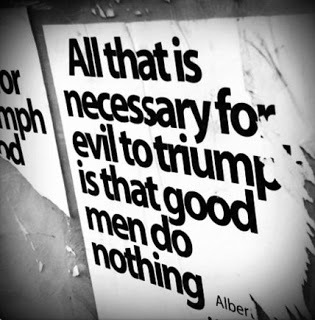 Note: This is taken verbatim from a FB post I shared the night it happened.
Note: This is taken verbatim from a FB post I shared the night it happened. Guys, I just got harassed. I just got harassed in "my" Starbucks, near my parish, where I've written so many books and plays and they all know my order. I'm in a cab and shaking, because I'm so upset.
This is what upsets me:
1) I bought a new to me long sleeved black shirt to go under dresses because I'm so out of clothes, and what I have is summer apparel.
2) Simultaneously, I felt bad this morning because I'm in another plateau of weight loss. And my thought was: well, I guess I'll just stop here. Fat has kept me safe thus far. (I immediately dismissed that, and flagged it for my, "Chat with therapist" file. Still. "Being fat," in my mind, HAS kept me as less of a target. And "getting skinny" has made me worried that I'll be subject to greater assault.)
3) Fine day. Good, even. I wore my new tights. I wore my kicky boots. Black long sleeved blouse. Red and black dress. Red Victorian pea coat. I looked cute. Noticed a sketchy old man in flip flops staring at my legs as I walked to the train. I put on my best scowl. Didn't dissuade him. Literally SNAPPED my fingers to pull his eyes to my face. He looked up. And then back down. I crossed the road and quickened my step and cursed this fallen world. Happy to see a Dad with his little girl pass me by with barely a glance. Still.
4) Received a few compliments about my outfit from a friend, from a colleague. These were fine. One at the parish said: "Christmasy!" I marveled at how the same appreciation can be so vastly different. How easily intent is known.
5) Went to "my" Starbucks. Had a great TTF meeting, then a good few hours brainstorming the never-ending novel, and looking up word etymology, when...
6) A drunk, older guy comes in. Reeking. HUGE open Corona in his hand. He looks around. The just announced Starbucks closing. It wasn't very full. He sits down right next to me.
I start packing up anyway. I give him The Eye, which is usually enough to get anyone to back off. He says something. I answer that Sbux is about to close. He responds:
DRUNK. Nice arms.
ME. (Holding up a finger. Looking him in the eye.) No.
DRUNK. You can't take a compliment? You don't want me talking to you? You've got nice arms. (Etc. etc.)
I get nervous and pack up quicker. I don't know if he's going to get violent. He reeks. He's inched towards me.
There's a well-dressed young man on the other side of him. He says nothing. There are two middle aged gentle looking Dad types at nearby tables. They see, and are also silent. The man is still going on. No one helps. I stand up.
ME. (Going to the trash, in the middle of the store. Looking around. Raising my voice.) THIS MAN IS HARASSING ME. He's a drunk, and with everything in the news, is NOBODY going to do or say anything?
ONE DAD. Well, you can sit here...?
(Aside: Oh, dude. No. No no. Moving is not the key. YELLING at the man and removing HIM is the key! What the what?!)
DRUNK. (Louder now.) All I said was you got nice arms? You gotta make a scene? What, you a prima donna? You're a prima donna, lady? I'm *complimenting* you...
Fortunately, just then the young Sbux manager, who has gages in his ears, came up and got the man out. Not correcting him, but just saying he couldn't be in there. He also apologized to me. Really sweet. He used his body - and he was slighter and younger than the heavy drunk - and got the guy out the door. Only one who helped.
Turning back to the still-useless dudes, one sleepy Dad says: "Well, at least the manager removed the guy. Most of them let them stay." No mention of ever doing anything HIMSELF, that man when he sees, apparently, this behavior ALL THE TIME.
Everyone leaves. I'd been planning to go grocery shopping, but hail a cab instead. So now I'm more broke with less food - and that's collateral damage from this guy, too. And damage because ALL THESE GOOD MEN LITERALLY FUCKING SAT THERE AND WATCHED IT HAPPEN. EVEN AFTER THEY'D BEEN DIRECTLY ASKED FOR HELP.
And part of me thinks of never losing weight or dressing nice again. Or going to that Starbucks.
...And you wonder why I'm so flipping mad lately. But I was shaken, and I was targeted, and I was just minding my own business and I'm afraid this behavior will only increase and the power of my scowl will decrease as I lose weight, and reading this back I even think: "Oh, I was overreacting," but
NO.
NO. NO. NO.
YOU DON'T GET TO MAKE ME FEEL UNSAFE.
AND I WISH I'D MADE ALL THOSE LAZY-ASS MEN PAY FOR MY CAB.
AND I CAN'T BELIEVE ONE FUCKING DRUNK SCARED ME ENOUGH THAT I DIDN'T BUY MY G-D GROCERIES.
THIS IS REAL, PEOPLE.
LITERALLY:
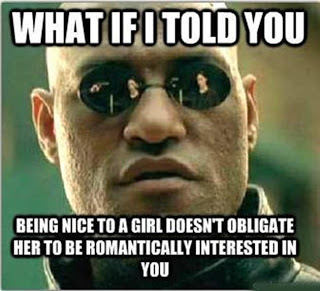 MAN. UP.
MAN. UP.ADDENDUM from a week later: It was interesting to see the response of men and women to my thread. And it was this that convinced me to make this thread public.
On the thread itself, most of the men were kind. One rich guy postured about his own prowess, and I rolled my eyes and tried not to hate men. And then, a household brother of mine, the father of a large family and a fellow Catholic wired me some money - no posturing, not even a note. Just: this is what you need. I will help you and not need credit. I broke down in tears and immediately thanked him. He never liked or even commented on my thread. Just did what needed doing from his own poverty.
A girlfriend of mine asked to share my story. She's sent back a lot of encouragement from other women. I appreciate that. And I've had many girlfriends give me some great advice.
My brother-in-law, a good man, shared my post with several other conservative-Christian brothers on-line, saying that after searching his own heart, he was afraid that his own fear wouldn't have made him stand up for me. And that he wanted to change that reaction. These supposedly God-fearing men then started bashing on feminism for ruining everything for men, and my brother-in-law's mouth hung open at the flip side of misogyny.
So, I'm sharing this post. Because, as one friend said:
The greatest crime there was the room full of apathy.
In reflecting back on this experience, with friends, with my therapist, it strikes me that what is needed from men and women is courage. I had courage in that moment, even if I needed to run away a moment later. (I'd call that wisdom in retrospect, too.)
Those men who just sat there, though, who boasted about always sitting there, who invited me to stay seated there - those men are cowards.
Those men who blamed courageous women, calling them feminazis, from the safety of their "God-fearing" pious-ish-ness: they are cowards.
Those men who posture and say, "I would protect you, were I there. If only you were brave, Emily, like I am!" And then do nothing. They are cowards.
That man who simply stood up and got the drunk out. He's a hero. He may have been shaken after, too. I imagine he was. But he was a hero. My household brother who helped me out financially. He is a hero. He is courageous. He actually trusts in God's providence. He is actually doing God's work. Even my brother-in-law admitting his own soul searching: that's courage. That's heroism. That's action. That's doing good.
And if I want to continue to be courageous, I need to keep losing weight - not for you, for myself. For my health. If I want to be courageous, I need to keep being ok with looking nice. Again, not for you, but for myself. Yesterday, I dressed up for the Feast of the Immaculate Conception. Once again, my legs were visible in leggings. (I've got great legs.) Once again, I saw a random dude look me up and down. I shuddered inwardly and scowled at him.
Dear God, for the love of all that's holy, Men! Can you please realize the COURAGE it takes for a woman to be simply visible??!?!
So, I want to encourage you to be courageous - to literally take heart. To delve into your heart. To share your story. To share your failure, and to seek to be better. To know your failings. To take ownership of them, and to work to fix them, and to apologize immediately when you fall again.
Because you know what would be nice, gents?
If I wasn't in danger from you, just because I wore a dress.
Published on December 09, 2017 15:19
November 17, 2017
The Memory of Roses: An Allegory of Depression
 For the past three years, I've been feeling like a Big Fat Loser Who Loses Things (a pejorative, surprisingly, *not* particularly associated with my weight).
For the past three years, I've been feeling like a Big Fat Loser Who Loses Things (a pejorative, surprisingly, *not* particularly associated with my weight). I write this because it's colored pretty much everything I do - or rather, Did Not Do. I write this, because I'm not saying this is how you, dear friends, viewed me, but because this is absolutely how I viewed myself. I write this with the full knowledge of all the things I "succeeded at" in this time, and how not a bit of it made a lasting difference, or made me fully feel like "my old self" again. Not really. Not deep down.
I honestly can't say what's changed. Up to last week, I was still having minor (and one or two less minor) panic attacks about "succeeding." (At what?, you ask? At anything, really.)
At the same time, the ever wily Holy Spirit arranged to have me give a series of inspiring personal talks to various people in my circle: always tapping me on the shoulder as I exclaimed to whomever, "You can do it! You can totally do it!" and whispering to me, "You *do* hear yourself, Emily? You do hear how easy it is to encourage others? You can probably encourage yourself."
I also had the opportunity to be in Very Fancy Places...only to be reminded (again, and again, and again, and AGAIN) that "success" looks pretty much like what "poverty" looks like, too. And in some cases, I've got more in my poverty than they've got in their success. So what does it matter if I downgrade to success? It's just the matter of a worse room at a better address. And the job stays the same. The job stays EXACTLY the same. You just shell out more money for worse stuff that people pretend to value more. But the job, the work remains the same. And maybe, if you've got the money, you shell it out to people, and not back into stuff.
And now I'm getting nervous writing this out again. Because the more Real things get, the more Scary they get, too. Not scary: unknown. Because the more you let yourself want something, the more it might hurt if you don't get it. And I didn't get it - I really didn't get it - three years ago. And I had really, really - like never before, wanted. And *allowed* myself to want. I allowed myself to want. Want something for myself. Not for someone else's good. For me. To allow, for me. And still, I gave away. Or rather, never had. Or rather, had it when I couldn't see, and had it gutted from me as soon as I had looked.
And it was like the first time you find out the rose has thorns. And like a fool, I kept grabbing the thorns, hoping they'd bloom back into roses. And my blood dripped out, making patterns on the ground: but the soil had gone bad, and when at last I let go of the dead, dry branch, I could no longer feel my hand.
Losing weight has been, in some way, a personal middle finger back to the dying rosebush and the girl who clung on to it. But to lose - to just lose and keep losing, even weight - is not enough to return me to the girl who once upon a time tended a whole riotous garden of roses: climbing, cabbage, tealeaf, Tudor. All with thorns, she now knows: but she wore thick gloves back then. And only took them off for that one exquisite bloom; not even noticing the moment they slipped off, until the thorn broke through.
For a while, I tried to stay in the garden. For another while, I tried to handle roses with bare and bleeding hands. For yet another while, I wore thick gloves that only served to bind the stigmatic thorn deeper in the skin; and then another pair of gloves on top of that, and yet another pair and then another, and gave the gloves to others, and then gave away the garden and the garden keys, too, and stuffed my gloves - three hands thick and still they bleed - beneath my arms and paced around the garden that bloomed blotchily in my absence. Bloomed in some places. Eaten by bugs in others. Choked with weeds, or just abandoned...but still, it turns out, wick.
Most days as I paced outside the garden, I wanted to incinerate it all. No matter that some things still bloomed, where even I could see. So I stayed outside the garden, so I wouldn't burn it down.
Then, as these things do, even I couldn't ignore the dead patches of grass, the withered ivy vines on the outside of the garden. I went back in myself, but couldn't save the places that had died out while I'd been gone. The blight and dead rot that had crept in. I tried to bring them back to life again, but I had no more blood to give. It had crusted around the thorn, inside the layers of glove that looked more and more like skin, so that my fingers could barely function.
And the branch itself, where that perfect rose had bloomed once; bloomed in multiplicity; bloomed in breathtaking ache; that branch in the center of the garden, had grown monstrous: thickly coiled on itself, with no more buds, nor even thorns, its roots disgorging from the earth, its twigs tangled on itself; a single leaf that fluttered once and fell. It buried me, and I buried it. Fell apart in fire that burnt a little bit, but left mostly indifferent ash that crumbled in my breath, along with the memory of roses, and a thick taste on my tongue that keeps me still from speaking.
I got rid of the gardener, who said they meant to head off anyway. And the gloves, in the end, had to be surgically removed. The dried blood, nearly as thick as a glove itself, carefully and gently washed away. And too often, far too often, it still stung. I kept the thorn, all that still remained, deep within the center of my palm - at least for a while. It was worth the pain, I thought, for the memory of roses.
I put a comical bandaid over the stigmata - with far too many nights staring at the scar. Until one night, I got out my sharpest needle and removed every last scrap of severed splinter from the skin. And still it stung. I sought after gauze, and go back weekly to have the bandage changed.
I looked up, looked around the garden: the bones of a garden, now with new wildflowers that sprang up among my careful roses, all in a winter state with prickly tops where the blooms might be. I got a few more gardeners. And some experts in wildflowers, since daisies and black-eyed Susans and even thistles can be lovely, although I don't know how to tend them. A few perennials and prickly conifers gave the hint of greenery, and I was grateful for them. Grateful they'd been planted there, just before my absence.
There were more visitors than ever to my garden. Not just myself and my roses and those people who might tend them. It grieved me, embarrassed me to have tourists in my garden, with its broken branches and haphazard patches of foreign wildflowers and barely a single rose in sight. And everything in winter. Always, always deep in winter. With the fragile, frozen hope that the branch was wick.
I suppose, then, I was surprised by Spring.
I didn't recognize the sudden rush of blood back into my cheeks. It felt again like dying. I still have trouble believing in the dexterity of my hand; having gone so long without, I've forgotten how to feel. Every sensation is a shock. It still takes a leap of faith to believe the daisy has no thorns. Because I know thorns now; I've grown several of my own and sheathed them by my side, ready to fight back, even with my broken hands.
But still, but still, OH GOD, I want my roses. Want them with an ache I barely dare acknowledge. And every waft of spring, every errant scent of someone else's garden, every dainty seed alarms me. Not because it's monstrous, but because I want, I want, I want, I want - and my heart throbs and leaks out of my hand, soaking through the bandages that my doctor wraps more thinly around the mess of skin and bone that lies beneath.
My parents came into the garden. "Why don't you plant roses?" they asked me. "You plant the most beautiful roses. And no one knows how beautiful your garden can really be."
"I can no longer plant roses," I tried to say to them. And it felt like the thorn was in my hand, in my heart, stabbing through the back of my tongue, and had never fallen over in indifferent ash, collapsing to the earth and blown away by dragonflies.
"Do you see the daisies there?" I asked. "And we've got evergreens and ivy, too."
"Did you plant them?"
"No. I don't plant roses now. I've got many gardeners. And friends have brought their seeds: we've got thistledown and starwort in the corner."
My parents are silent. They smell like the memory of roses.
"I've been to other gardens," I say. "Tending to their flowers. Lilypads and Queen's Anne's Lace; there's a promising begonia among them. Moss, too. Many mossy gardens."
They sigh. They sound like the memory of roses.
I eye the barren patch of earth. The only naked patch. In the middle of the garden. I scratch my palm, over the bandage. But there's nothing there anymore. No scab, no thorn, no skin, no bone. As hollow as the hole where the branch had been. In the middle of the garden. I've let the bluebells and buttercups run rampant around the perimeter. I've torn up every violet.
My parents mutter something nice. They are nice people. And then they hug me and say again: "Your roses, once, were beautiful. Plant some roses. Remember who you are."
I can't. I can't. I can't. I spend sleepless nights pacing through the garden. Keeping eye on the progress of each orchid. Relaxing in the hydrangeas. Smelling the rich, intoxicating scent of someone else's lavender. Ghosts waft through: day, night. They are silent as they pass; bend, weed, tend, laugh - although I cannot hear them.
One bright day, I look up from my bower, half-sleeping; one eye lowered, seeing red; the other glancing upward at the thin branch above my brow. A bud; the promise of a bud; the shape of thorn and flower.
It's almost too much to hope for. It is dangerous to want.
But I know how to grow roses. I know how to grow mountains made of roses; arcs and buttresses and nations made of roses. I know how to coax them through the dormant months. They thrive first on belief: on the memory of roses. I believed once, too. Believed past the point a sane man would believe in. I made planets out of roses. I made galaxies, and stars, and danced with comets in my hands. Nothing frightened me, and I was always eight years old, with flowers in my hair, and the memory of roses in my heart; and my hem was made of Dusk and my fingers glowed with Day.
And I ache. I hurt. And I think:
I will try to grow this rose. Just one. Just this little one.
I breathe out a handful of ash; and let the light get in.
Published on November 17, 2017 10:51
November 14, 2017
Death, Sex, and THE GOOD PLACE
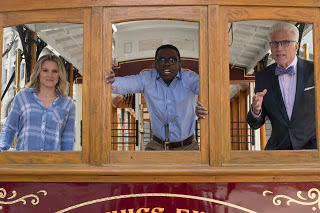 When I was teaching theology, I didn't articulate (or understand) end of life issues terribly well. I knew the general rule of thumb was that we were against hastening death (a la Kevorkian or the terrible things happening in the Netherlands), but that it was somehow also ethical to not prolong the moment of death for a loved one through excessive use of machinery.
When I was teaching theology, I didn't articulate (or understand) end of life issues terribly well. I knew the general rule of thumb was that we were against hastening death (a la Kevorkian or the terrible things happening in the Netherlands), but that it was somehow also ethical to not prolong the moment of death for a loved one through excessive use of machinery. The difficulty comes down not to absolute rules but rather to ethical intents - which are harder to judge from the outside, since two actions may look the same.
For example, one person may refuse chemo because she wants to live as fully as possible in the time remaining, and die whenever the Good Lord takes her. Her intent is to live; not to hasten her death. Another may refuse chemo precisely in order to hasten her death, which is a problematic stance. It all comes down to ethics.
Now and at the Hour of Our Death
I personally, and with the Church, condemn any action intended to cause another person harm, to hasten death - which is to put it bluntly: murder. However, the problem in that teaching is that we all want a list of definitive rules: chemo yay or nay? Vaccines? This pill? That drug? Etc. etc. etc. It's enough to cause some pretty dramatic divides between current political tribes that are based more on tribal wisdom (X is always the right choice!) rather than study of the thing itself ("How does X actually work?") and its application in the particular circumstance. ("X is a good thing, but person Y has a bad reaction to it. Hence X is not good for Y.")
But this, my friends, is exactly why the commandment is simply: "Thou shalt not murder." Or, "Do no harm." It speaks not only to the action, but to the intent. It's a matter not just of law, but of ethics. (You can read about this more fully, especially in regard to end of life issues here.)
Paved with Good Intentions
If you don't have time for reading, however, you can enjoy a quick primer on the importance of intent from the TV show: The Good Place. Season 1 is now on Netflix, and they're currently at the midpoint of Season 2. This quirky and really excellent show's from producer Michael Schur of Parks and Recreation, and examines what happens if a "bad person" gets into the "good place." (Spoiler warning: but you can read about his plan here.)
Among the things the show looks at is whether you can do a good action with ill intent, and still get "points" for being good. This is a concept that's tough to get students' minds around, especially in an age that tends to think along juvenile karmic lines. As though "The Universe" were one big Facebook like or dislike in the sky.
C. S. Lewis in The Great Divorce showed beautifully and frightfully how we can fool ourselves with good actions and bad intents: the mother who codependently smothers her son's inner life; the artist who works only for her own glory; the husband who wanted his wife to have no affection for anyone but him. In a million small and selfish ways, we can corrupt our ethical intelligence which looks honestly at our intent, and not just at our actions.
Looking for a Few Good Men
Which brings me to the current sex scandals breaking from Hollywood and the political scene every other day. Many of them - Harvey Weinstein in particular - are so gross that it's easy to condemn them. Even easier, since it's clear that they're only sorry they were caught. Where there is no remorse, there is no opportunity to forgive. There is no desire to change. "The Gates of Hell are closed from the inside," as Lewis reiterated.
However, it's been interesting to see the reactions among my friends to the case of Louis CK. Partially because he's apologized somewhat. Partially because his stand-up was almost a continual confessional. Partially - and this is the important part - because his case has made more people consider their own actions...and the intent behind their actions.
It's easy to see how Weinstein is a monster. Manipulative, aggressive, scary. But then we look at the case of Louis CK, not excusing his actions by any means, but understanding how two women felt obliged to allow him to masturbate in front of them. How the comedian could have considered himself above the line "because he asked permission first." How, technically, every box of consent was ticked, and journalists even feel the need to keep the permissions open by adding in several articles: "Don't masturbate in front of a woman...unless she asks for it."
Well.
A lot of those fingers we were pointing can curve around pretty quickly to make us look at ourselves.
Which is to say, just as ethical intent must be considered in regards to death, so ethical intent must be considered in terms of sex and relations.
Is Consent Enough?
This is the final question I want to ask: is consent enough?
I don't think so. And here's why:
In order to be able to fully consent to something, you need to have your full mental faculties, but you also need to have been fully formed in the thing you're consenting to. You need to know your options.
Think of it this way: if a man or woman is traumatized as a child, or is raised poorly (or by sitcoms), and thinks that every romantic encounter must end in sex, then although that person may consent each time, they've never been given any other model or action.
We see this illustrated in the accusers of Kevin Spacey and Roy Moore: both accusers were molested by those older men as minors, and spent the majority of their lives thinking they had given their consent, that they had wanted that relationship, that what they experienced at the hands of their predators was normal.
But neither of those victims could consent. Their ethics were skewered by those men who preyed upon them. So, too, I'd imagine that many of the women who were victimized by Louis CK or Brett Ratner or Harvey Weinstein were ethically compromised before they ever met their aggressors: just by the culture that we live in; the culture that we make; the culture that told them, repeatedly, that they had no choice but to play along.
Now think about your own shameful sexual adventures. The ones that make you start to wonder: what happens when they come for me? That time you pushed a little too hard. That time you weren't sure if "no" meant "no." That time, and that time, and that time, and...
Go Now, and Sin No More
So. Are you damned? Is each one of us just waiting for the crowd to come with stones to pull us away? Is there no forgiveness? No redemption? Is your one big, shameful sin (and we've all got at least one big, shameful sin) enough to negate any good you've ever tried to do since?
No. That's a lie. And it's a lie intended to make you despair, and just do bigger and more shameful violences.
Can you just be forgiven and change nothing in your life? Can you just say sorry and be done with it? Do a twelve step program, get your certificate, take some pills and make amends?
That may not be enough. Words and signatures may soothe your shame, but may not be enough.
What then can you do?
It's that old message: "Repent, and sin no more."
We all are the woman caught in adultery. Every single one of us deserves to be stoned. So how can we change our lives?
A few things: Confess. Realize the people you broke aren't the people you can heal. Realize the people who broke you aren't the people who can fix you. Come face to face with what you did wrong, and (probably) remove yourself from that situation. Entirely. People can be an addiction, too. Habits can be addictive. "Better to cut out your eye and enter Heaven...!"
And then:Change your life. Make a conscious effort to be someone new. I don't know what that means for you. Make amends with your spouse. Live chastely. Go to confession. Go to therapy. Change your patterns. You'll make a mistake. Make a big mistake. Total backslide. Begin again. Confess your sins. Change your situation. Do your penance. Die to yourself. Pick up that cross and walk. Every day. Every day. Every day.
And in the meantime? Watch The Good Place. It's got Ted Danson.
Pax.
Published on November 14, 2017 12:13



